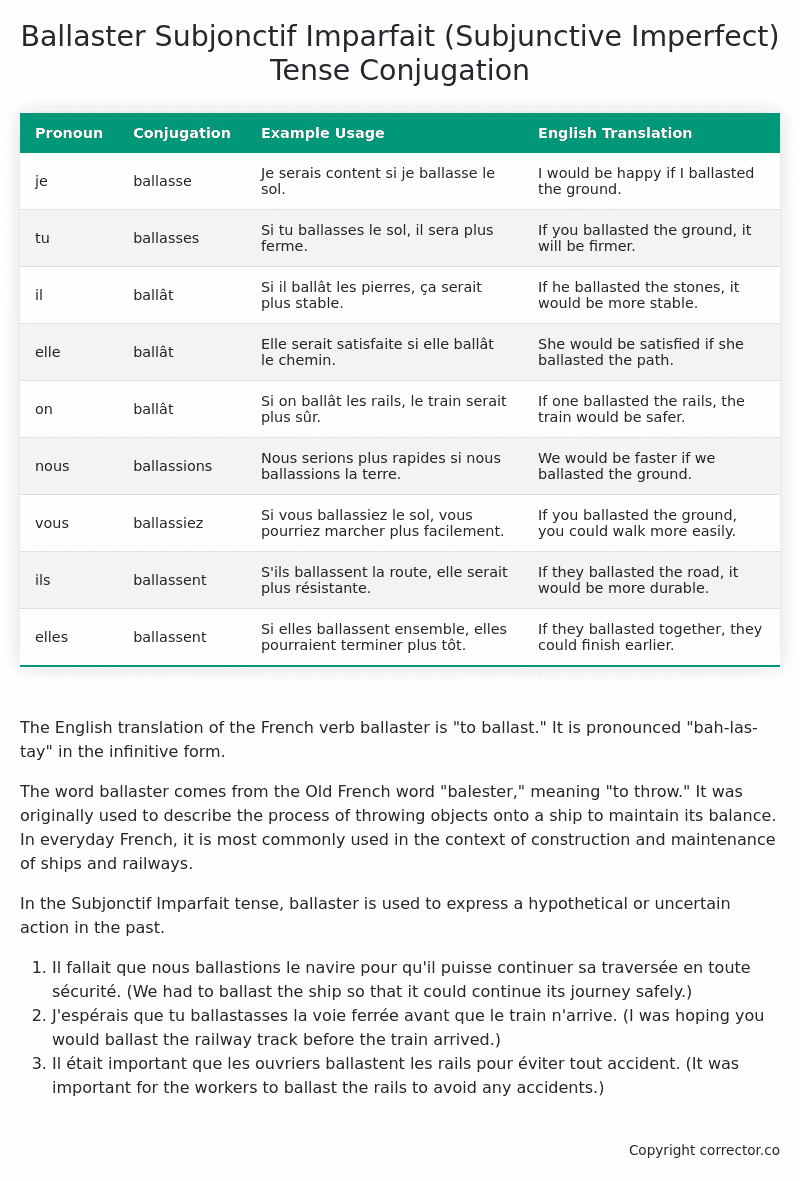Subjonctif Imparfait (Subjunctive Imperfect) Tense Conjugation of the French Verb ballaster
Introduction to the verb ballaster
The English translation of the French verb ballaster is “to ballast.” It is pronounced “bah-las-tay” in the infinitive form.
The word ballaster comes from the Old French word “balester,” meaning “to throw.” It was originally used to describe the process of throwing objects onto a ship to maintain its balance. In everyday French, it is most commonly used in the context of construction and maintenance of ships and railways.
In the Subjonctif Imparfait tense, ballaster is used to express a hypothetical or uncertain action in the past.
- Il fallait que nous ballastions le navire pour qu’il puisse continuer sa traversée en toute sécurité. (We had to ballast the ship so that it could continue its journey safely.)
- J’espérais que tu ballastasses la voie ferrée avant que le train n’arrive. (I was hoping you would ballast the railway track before the train arrived.)
- Il était important que les ouvriers ballastent les rails pour éviter tout accident. (It was important for the workers to ballast the rails to avoid any accidents.)
Table of the Subjonctif Imparfait (Subjunctive Imperfect) Tense Conjugation of ballaster
| Pronoun | Conjugation | Example Usage | English Translation |
|---|---|---|---|
| je | ballasse | Je serais content si je ballasse le sol. | I would be happy if I ballasted the ground. |
| tu | ballasses | Si tu ballasses le sol, il sera plus ferme. | If you ballasted the ground, it will be firmer. |
| il | ballât | Si il ballât les pierres, ça serait plus stable. | If he ballasted the stones, it would be more stable. |
| elle | ballât | Elle serait satisfaite si elle ballât le chemin. | She would be satisfied if she ballasted the path. |
| on | ballât | Si on ballât les rails, le train serait plus sûr. | If one ballasted the rails, the train would be safer. |
| nous | ballassions | Nous serions plus rapides si nous ballassions la terre. | We would be faster if we ballasted the ground. |
| vous | ballassiez | Si vous ballassiez le sol, vous pourriez marcher plus facilement. | If you ballasted the ground, you could walk more easily. |
| ils | ballassent | S’ils ballassent la route, elle serait plus résistante. | If they ballasted the road, it would be more durable. |
| elles | ballassent | Si elles ballassent ensemble, elles pourraient terminer plus tôt. | If they ballasted together, they could finish earlier. |
Other Conjugations for Ballaster.
Le Present (Present Tense) Conjugation of the French Verb ballaster
Imparfait (Imperfect) Tense Conjugation of the French Verb ballaster
Passé Simple (Simple Past) Tense Conjugation of the French Verb ballaster
Passé Composé (Present Perfect) Tense Conjugation of the French Verb ballaster
Futur Simple (Simple Future) Tense Conjugation of the French Verb ballaster
Futur Proche (Near Future) Tense Conjugation of the French Verb ballaster
Plus-que-parfait (Pluperfect) Tense Conjugation of the French Verb ballaster
Passé Antérieur (Past Anterior) Tense Conjugation of the French Verb ballaster
Futur Antérieur (Future Anterior) Tense Conjugation of the French Verb ballaster
Subjonctif Présent (Subjunctive Present) Tense Conjugation of the French Verb ballaster
Subjonctif Passé (Subjunctive Past) Tense Conjugation of the French Verb ballaster
Subjonctif Imparfait (Subjunctive Imperfect) Tense Conjugation of the French Verb ballaster (this article)
Subjonctif Plus-que-parfait (Subjunctive Pluperfect) Tense Conjugation of the French Verb ballaster
Conditionnel Présent (Conditional Present) Tense Conjugation of the French Verb ballaster
Conditionnel Passé (Conditional Past) Tense Conjugation of the French Verb ballaster
L’impératif Présent (Imperative Present) Tense Conjugation of the French Verb ballaster
L’infinitif Présent (Infinitive Present) Tense Conjugation of the French Verb ballaster
Struggling with French verbs or the language in general? Why not use our free French Grammar Checker – no registration required!
Get a FREE Download Study Sheet of this Conjugation 🔥
Simply right click the image below, click “save image” and get your free reference for the ballaster Subjonctif Imparfait tense conjugation!

Ballaster – About the French Subjonctif Imparfait (Subjunctive Imperfect) Tense
Formation
Common Everyday Usage Patterns
Interactions with Other Tenses
Subjonctif Présent
Indicatif Passé Composé
Conditional
Conditional Perfect
Summary
I hope you enjoyed this article on the verb ballaster. Still in a learning mood? Check out another TOTALLY random French verb conjugation!


